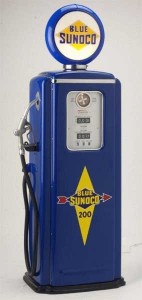
Gas prices aren't going to drop to levels when you got it out of this pump, in fact, they are expected to buck the trend of dropping during the summer.
Gasoline prices across the nation have remained relatively stable as the turmoil in Iraq continues to shake global petroleum markets, but the chances for a gradual decline in prices at the pump are receding, observers suggest.
GasBuddy.com estimated gasoline prices increased by three cents last week to an average of $3.683. However, the price of low-sulfur diesel oil has risen by roughly 10 cents during the past two weeks, reaching nearly $3 per gallon in the wholesale markets around New York Harbor.
Prices have not followed the established seasonal trajectory of dropping in the weeks after the Memorial Day holiday. Gasoline prices will typically peak in spring and retreat in June, and that’s not happening this year. In fact, the $3.67 average national price for a gallon of regular gasoline on June 18 was the highest it has been on that day since 2008 and is close to this year’s peak of $3.70, which occurred on April 28.
The higher gasoline prices are likely to remain this summer, according to the AAA.
“Despite hopes for a less expensive summer, it looks like Americans are stuck paying above-average gas prices,” said Michael Green, AAA spokesman. In May, AAA predicted the national average might decline 10-15 cents per gallon this month, but, given the instability in Iraq, it no longer expects that.
Before Islamic Sunni militants took control of Mosul, a city in northern Iraq, U.S. gas prices had declined 32 out of 44 days. Since then, they’ve steadily risen along with global oil prices, which account for at least two-thirds the cost of gasoline, according to AAA.
(Americans admit to dangerous behavior while driving. For more, Click Here.)
Unrest in Iraq, however, isn’t the only factor boosting gasoline prices. The expansion of the demand for automobiles, in particular in the U.S. and China, has helped push up the price of crude oil right across the globe.
(Click Here to get a look at the updated 2015 Mercedes-Benz CLS.)
Higher prices have created the incentives – and financed the new technology and techniques – needed for U.S. energy companies to increase oil production in U.S. by roughly 50% since 2008. The U.S. produced 5 million barrels of oil in 2008 and 7.4 million barrels in 2013 and the figure is expected to increase again this year.
(To see how Jaguar’s new F-Type convertible is driving sales, Click Here.)
Meanwhile, automakers are waiting to see if the modest increase in gas prices will shift buying patterns of American consumers, which have been leaning towards trucks and utility vehicles for the past year.

No the prices at the pump are creeping higher due to an industry monopoly that charges as much as the public will bear. Until the Feds talk about releasing crude reserves to lower the price, the oil extortionists charge all that they can.
The oil cartel and price gouging in fact have a lot to due with the economic collapse of the U.S., Europe and Asia and the delayed recovery of these economies. Financial greed is very destructive and consumers are paying dearly for the greed of the oil industry Cabal.
Well here we go again. First there is no oil shortage. The US produces more oil than it uses. Even if there was a interruption in oil in the middle east it wouldn’t affect us because we produce enough for our own use but none of that matters. The speculators and the oil companies are rejoicing now because here’s another execute to bid up the price of oil which will mean windfall profits for the speculators and the oil companies while the rest of us have to pay more, for what? It’s just not right. We need a better way to regulate the price of oil.
Yup, it’s all a sham and the media are part of the problem by perpetuating the consumer fraud as if it were actually true.
There are easy ways to regulate prices. Industry monopolies are always bad for consumers. These influential groups are able to “buy” the legislation they desire so consumers will always be exploited and defrauded with help from their elected officials…
Jim: The story doesn’t claim there is a shortage. But when one oil-producing region has some turmoil, there is a possibility that some oil-needy region will end up paying more…and if they pay more, then we all get stuck.
That said, I’m with you on the speculators…